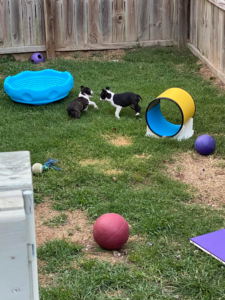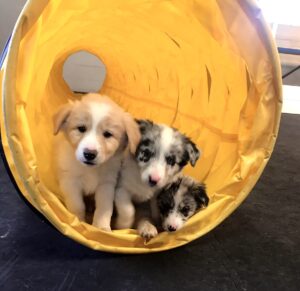 So you’ve decided to get a dog… congratulations! Preparing to add a furry friend to your family is an exciting process.
So you’ve decided to get a dog… congratulations! Preparing to add a furry friend to your family is an exciting process.
If you know you want a specific breed, be prepared to do some research. Not all breeders are created equal, and it’s important to make sure you choose a reliable, ethical place to get your dog.
If you’re not sure where to begin, don’t stress. Instead, read on to find out what to look for in a good breeder – and learn about some red flags to avoid!
Start Your Breeder Search
Most folks start their search for the perfect breeder online. This is an easy way to check out breeders in your area. Just make sure that the site you’re looking at is legitimate!
If you’re looking for a place to start, try finding the wesbite of the breed club for the type of dog you’re interested in purchasing (check this example for Goldens to get an idea).
Breed clubs are dedicated to upholding breed standards and will only recommend reputable breeders whose practices and health testing can be trusted. There is most likely a breed club in your city, with people that would love to help you find your next perfect companion. Chesapeake VA Dog Fancier Association or the Virginia Kennel Club are local and can be very helpful.
Try to steer clear of online hubs, even those that offer a “No Puppy Mill Promise.” Trustworthy breeders are extremely selective about where their dogs are placed, and probably wouldn’t agree to home dogs through any third party system.
Once you’ve found a breeder’s website, it’s time to dig deep and make sure everything checks out. Don’t limit yourself geographically – some great breeders may not live locally, and you may have to travel for the dog that is the best fit for your family.
Are there pictures? You’ll want to see high-resolution photos of the males, females, and previous litters of pups. Pictures should be recent, in-focus, and well-labeled.
Check the website copy, too. Even the most basic website should include a bit of background about the people, dog activities they are involved in, and why they do what they do.
With that being said, a website that looks overly professional might be a red flag as well. A dedicated breeder isn’t focused on making money – they want to better the breed in question.
If a website looks too slick, do a bit of research into its legitimacy before moving forward. Great breeders usually don’t need to sink a ton of money into their advertising.
Prepare to Ask Questions…
If the website checks all the boxes, don’t hesitate to reach out to the breeder to ask about next steps.
First things first, you’ll want to find out about their breeding stock and learn about health issues, behavior, pricing, and availability of puppies.
Find out if your breeder is registered with a breed club, and whether they do health testing and vet care to ensure that your puppy is in good shape before you take him home.
Most reliable breeders will make sure that your puppy has been examined by a vet and received his first round of vaccinations by the time you pick him up.
Ask about mom and dad’s health, too. Are there any genetic conditions they might pass down? How does your breeder test for genetic complications that may be associated with your breed?
A well-informed breeder will be able to tell you what genetic concerns exist in the breed or their line and how they avoid them. While no line of dogs is ever completely perfect, a responsible breeder will take steps to avoid the breed’s more common ailments.
Inquire about the temperament of your potential puppy’s sire and dam and outline any concerns or questions you might have regarding behavior and training. Again, no dog is perfect, but a good breeder will be happy to share details about their dogs’ personalities.
 It’s also important to find out what steps your breeder takes to socialize the puppies. Are they raised in the house alongside the family? Do they spend time inside and outside? Are they around children?
It’s also important to find out what steps your breeder takes to socialize the puppies. Are they raised in the house alongside the family? Do they spend time inside and outside? Are they around children?
The more you know, the better idea you’ll have of the kind of people you’re working with. Great breeders treat their puppies like members of the family and begin interacting with them right away.
Once you’ve gotten a read on the health, genetics, and socialization aspects of the breeder, find out how much your pup is going to cost.
Remember, purebred puppies can cost anywhere from a thousand dollars or a few thousand, depending on the breed. This is because good breeders work hard to maintain breed standards and eliminate problems that could otherwise cause heartbreaking health issues.
A high price usually indicates high standards and quality. A low price might be a sign that something is wrong and your breeder is cutting corners somewhere. But beware of breeders charging high prices for mixed breeds or ‘rare’ and off standard colors. That purple golden retriever should be a red flag, not a higher price.
Don’t forget to find out when you can expect your new friend to arrive, too! Many high-quality breeders have long waitlists. This is a good sign, because it indicates they are not overbreeding and have plenty of interest in the puppies they are producing.
Just be aware that you may have a few months to wait before you can expect a puppy to become available.
The pictures in tis blog are from one of the most dedicated breeders of Boston Terriers and Aussies I know. This is what great puppy socialization looks like. A lot of work goes into getting a happy, healthy and resilient puppy.
 (Interested in a perfect Australian Shepherd or Boston? Contact Elizabeth for Australian Shepherds and Boston Terriers!)
(Interested in a perfect Australian Shepherd or Boston? Contact Elizabeth for Australian Shepherds and Boston Terriers!)
…And Prepare to Provide Answers!
Great breeders care immensely about their puppies, so they’ll want to find out a bit about you, too! You should expect a potential breeder to have some questions for you as you get to know one another.
A good breeder might ask about your housing situation and your yard, your family set-up, and how much time you’ll have to spend with your new four-legged buddy.
Breeders might also ask if you have experience in owning dogs, if their are other pets in the home, or if you’re planning to invest in professional training.
They may want to know more about what activities you plan to do with your new dog and what kind of lifestyle you envision for your future together.
Be honest in answering these questions! It’s important to be upfront about your plan for caring for your puppy to make sure it’s a good fit.
These checkpoints aren’t meant to be invasive or exclusionary. Instead, they help the breeder get an idea of how your puppy will adjust to their new life with you. Just like people, puppies have different personalities – finding out about you can also help the breeder match the right puppy to the right home.
A breeder who doesn’t ask you anything is showing that they’re not concerned about where their puppy is placed, as long as they have a buyer. This does not reflect well on their standards!
Shake Hands (and Paws) in Person
If you’ve gotten this far in the process, it’s time to see if you can meet the breeder in person. Don’t be offended if a breeder doesn’t want to meet you in their home, they might be willing to meet you at a park or dog show to introduce you to their dogs.
I haven’t met most of my dogs’ breeders in person before picking up my puppy, but I built a relationship with them over the phone or internet.
A responsible breeder should be happy to show you dogs they have bred, their successes in dog sports and discuss their temperaments. They usually love showing you videos and pictures of how they raise their puppies.
Feel free to ask further questions about the dams and sires, how many litters they produce, how long they’ve been around, and why they began breeding. Most breeders will be delighted to tell you all about themselves and show off their beautiful dogs.
Pay attention to the details. Are puppies raised in or near the home, or are they outside and isolated? Is the place clean? Do the dogs look happy and healthy, or are they hyper and anxious? Is there space for all of the dogs to live peacefully, or do they appear to be overcrowded?
Many breeders will match you with a pup that seems to have the right temperament for your family, situation and needs. This is actually a very good thing, since your breeder has gotten to know your puppy’s personality in the weeks leading up to taking the puppy to your home.
Again, if anything seems off, don’t feel pressured to move forward. It’s always better to think things through carefully before your judgment is clouded by those cute puppy faces!
Moving Forward
If the breeder happily answers all your questions, the dogs look happy and healthy, and you’re feeling excited… hooray! You’re ready to make things final.
Typically, a responsible breeder will provide you with a contract for a companion puppy (which means you won’t be breeding the dog in the future).
Go through the contract together and make sure you understand everything that’s included. Your contract may stipulate when and whether your puppy is neutered. It may also include information about when you’ll be picking up your pup.
Your contract should provide documentation of any breed registration, health screenings, vet records, and genetic testing that will come with your cute new puppy, too.
Review any special circumstances, too. There’s always the unfortunate chance that your litter won’t make it to term, or something will happen to the puppy you’ve selected before you take it home. Double check to see how things will proceed just in case.
Almost all responsible breeders have a “welcome home” clause that requires puppies to be returned to them in case something happens to you or he can’t stay with you.
If the contract works for both parties, a good breeder will sometimes ask you to put a deposit down for your dog. Ask for a receipt or some kind of documentation for your records once money has changed hands.
Keep in touch with your breeder as you wait for your pup to be born and mature. Most breeders will be happy to send you pictures and videos to keep you in the loop on how your puppy is growing and learning.
While you wait, take steps to prepare your home and family for your new arrival. You can ask your breeder for tips on the type of food, toys, bedding, and gear they’ll need to thrive.
It’s a good idea to have a training plan in place as well. After all, it’s never too soon to start thinking about good doggy manners!
Many puppy owners find it beneficial to learn from the experts. A reputable training business like Freak On A Leash can help you hit the ground running when it comes to effective positive reinforcement training for your puppy.
Planning ahead with your breeder and a great trainer can make your puppy’s transition to the family a lot easier, for canine and humans alike!
 Enjoy the Ride
Enjoy the Ride
When you’ve prepared your home and gotten your training plan in place, you’ll be all set to head back to the breeder and bring home your puppy.
Once you’ve gotten settled in, keep in touch with your breeder. Let them know if you have any questions or concerns as you adjust to life with your puppy. Don’t forget to send pictures, too!
Bringing home a new puppy is one of the happiest occasions in any pet owner’s life. You can make it even more special by following these tips for finding a reputable breeder.
Do you have other great suggestions for finding an excellent breeder? We’d love to hear from you in the comments below!
Also, stay tuned for a companion post about how to find the best rescue dog for you, coming soon!

